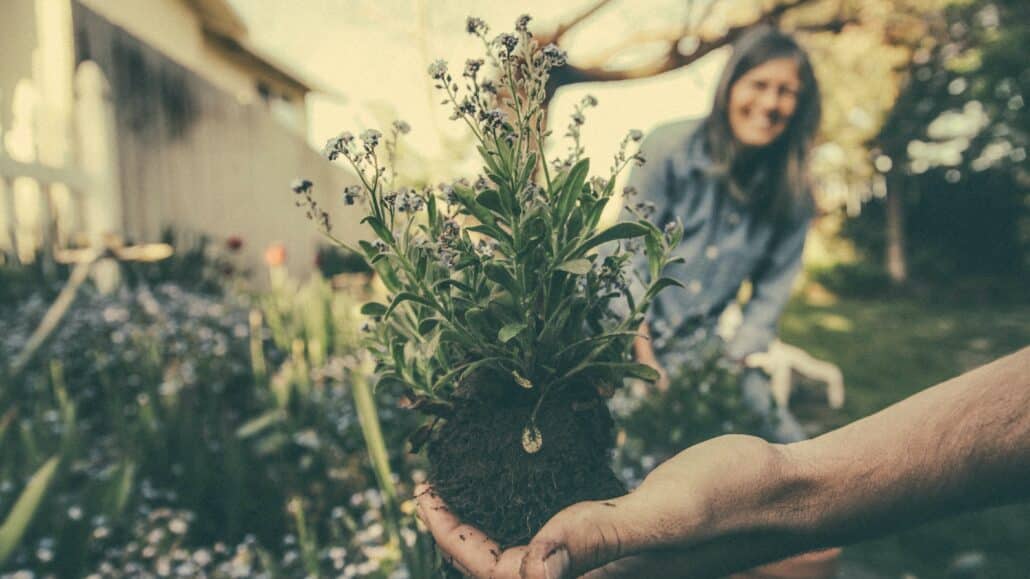When I’m turning the soil in my garden, sometimes I wonder how my father-in-law—a plasterer from the inner-city with a very small backyard—knew so much about organic gardening. He taught me as a young man about the miracle of growing vegetables from seeds. Now, two generations later, my sons and daughters-in-law raise gardens while the grandchildren hunt around for ripe cherry tomatoes. And my daughter, Colleen, coauthor of this column, plans a garden for her first house.
Organic gardening celebrates God’s earth by creating a natural and chemical-free environment to plant seeds, grow plants, and harvest vegetables. Steps to make a garden organic include planting chemical-free seeds, using natural sources of fertilizer to build healthy soil, rotating crops, and applying natural substances and techniques to control pests.
Organic practices can be applied to a garden of any size: cramped urban gardens, mid-size urban community gardens, or large farms. Creative urban gardeners grow an abundance of produce in tight quarters using pots, raised beds, trellises, and hanging planters. For those with no space at all, community gardens exist in most metropolitan areas.
Go Organic
As with any garden, select a place with adequate exposure to the sun (minimum six hours each day) and good drainage. Use organic or untreated seeds that are, ideally, indigenous to your region. These are available in garden centers, catalogs, or seed suppliers.
Plants get nourishment from the soil, so feed the soil in your garden with complex nutrients, such as decaying leaf mold, compost, green manure, and dried animal manure. Complex nutrients are broken down by microorganisms, worms, and insects to feed plants naturally and provide immunity against pests and disease.
Rotating crops can strengthen the soil by alternating related vegetables in different spots year-to-year. Likewise, planting root crops, such as carrots and onions, in places where non-root crops, such as tomatoes and peppers, were the season before is a healthy soil practice.
As an organic alternative to pesticides, make plants and gardens less desirable to pests by taking preventive measures, such as weeding, using natural fertilizers that are resistant to pests, and good moisture management (drainage).
Promoting Wellness
Organic gardening promotes wellness in many ways. It shows a respect for God’s earth, offers physical activity, relieves stress, restores balance to life, and puts you in touch with nature.
Get moving. Gardening uses a variety of muscles. When gardening, we bend, stretch, pull, and plant. More strenuous chores, such as assembling fixtures, constructing raised beds, erecting trellises, and building irrigation systems burn calories. It is estimated that a 150-pound person burns 326 calories per hour gardening.
Eat nutritionally. Eating vegetables closer to their actual harvesting date means more vitamins and minerals. They also tend to be more flavorful.
Spirituality in nature. The soil is an ecosystem—a universe within a universe—created by God. Working the garden is a labor of love that creates a natural and wonderful connection with our Creator.
Organic gardening is a wholesome and rewarding activity that pays wellness dividends. Preparing the soil, planting seeds, nurturing plants, and harvesting wholesome and healthy food is doing God’s work.
Beginner’s Dictionary
Organic gardening: Raising plants without the use of synthetic fertilizer, pesticides, or herbicides.
Untreated: Chemical-free.
Complex nutrients: Fertilizers, such as compost, green manure, and dried animal manure.
Green manure: Crops that have been uprooted and placed under the soil.
Compost: Natural fertilizer, such as egg shells, unused portions of vegetables and fruits, etc.








